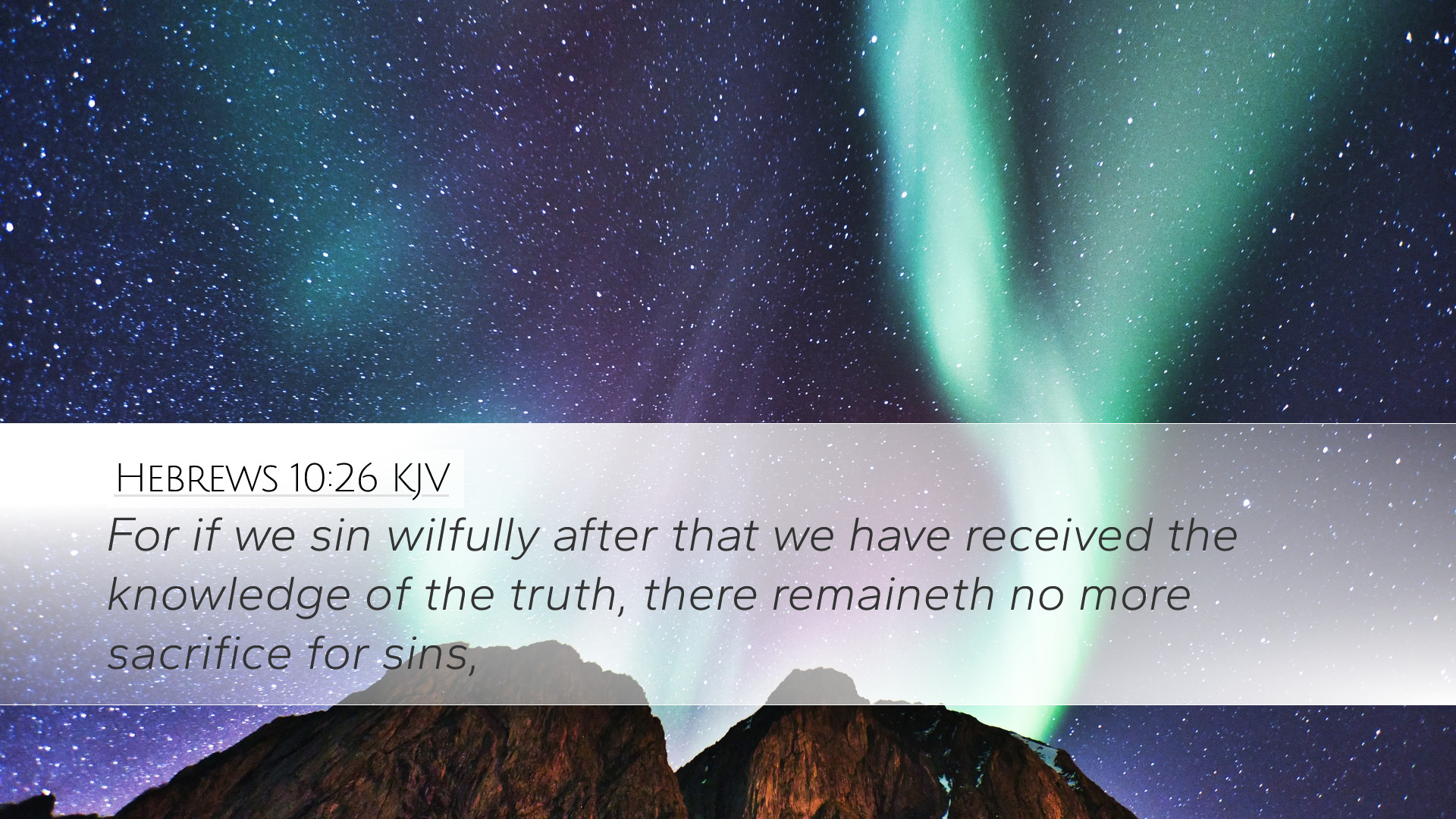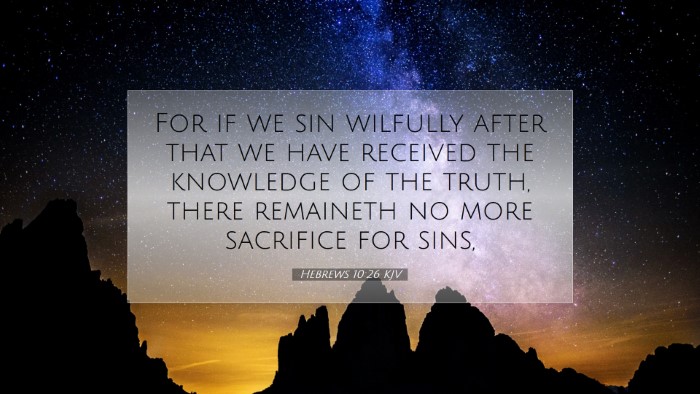Hebrews 10:26 Commentary
Verse: "For if we sin willfully after that we have received the knowledge of the truth, there remaineth no more sacrifice for sins." (Hebrews 10:26)
Introduction
The verse Hebrews 10:26 presents a solemn warning to believers. This passage is often cited in discussions regarding the nature of apostasy and the seriousness of willful sin after the reception of truth. It serves as a foundation for an important theological debate about grace, accountability, and the eternal security of believers. Our exploration combines insights from several public domain commentaries to provide a comprehensive understanding of this critical text.
Matthew Henry's Insights
Matthew Henry emphasizes the weight of the warning in this verse. He articulates that willful sinning implies a deliberate choice to rebel against known truth, which constitutes a serious violation of one’s relationship with God. Henry indicates that after receiving the truth of Christ’s atonement, to then turn away is to reject the only sacrifice that can atone for sins. He warns that such actions lead to a state where the sinner is devoid of hope, as no further sacrifice for sin is available.
- Willful Sin: Henry explains that the term “willfully” indicates intentionality. It implies a conscious decision to reject God's commandments.
- Knowledge of the Truth: He highlights that the knowledge received is complete and refers to the revelation of Jesus Christ as the ultimate sacrifice for sin.
- Consequences: He asserts that the result of this rejection is grave, as it leads to spiritual peril and the absence of a path for redemption outside of Christ.
Albert Barnes' Perspective
Albert Barnes offers a pastoral approach in his commentary, focusing on the implications for the community of believers. He indicates that the audience of Hebrews was at risk of becoming disheartened and possibly returning to a form of Judaism. Barnes highlights that understanding the gravity of turning away from Christ is vital for maintaining faith amidst trials.
- Sacrificial Finality: Barnes notes that this verse reinforces the finality of Christ's sacrifice and the futility of engaging in any works or sacrifices that could negate it.
- Community Accountability: He suggests that the author of Hebrews warns against the thinking that sin can be taken lightly, reminding believers of their responsibility to the community and God.
- Encouragement to Persevere: Barnes encourages readers to endure in faith, reminding them that their labor is not in vain and that there is redemption found in Christ alone.
Adam Clarke's Commentary
Adam Clarke provides a nuanced theological perspective, underscoring the severity of apostasy. He describes the implications of willful sinning in the context of the new covenant, differentiating it from the sin offerings of the old covenant.
- Understanding Apostasy: Clarke emphasizes that this passage addresses the danger of apostasy and is directed to those who have had a profound understanding of salvation yet choose to reject it.
- Nature of Sacrifice: Clarke posits that once one has turned away from Christ, they cannot return to a state of innocence and thus have no atonement left.
- Theological Implications: He discusses the theological ramifications for understanding grace in light of willful sin, suggesting that while grace is abundant, the rejection of it leads to irrevocable consequences.
Theological Themes
This verse brings forth several theological themes that hold significant value for pastors, theologians, and scholars:
- The Nature of Sin: The concept of willful sin in this context raises important questions about the nature of sin, accountability, and the heart's condition.
- The Finality of Christ's Sacrifice: There is a strong emphasis on the sufficiency of Christ's sacrifice, suggesting that once one understands and accepts this truth, turning back signifies a complete rejection.
- Community and Individual Responsibility: This passage underscores the interconnectedness of faith within the community and the individual’s role in maintaining a relationship with God.
- Grace and Judgment: The balance between the grace of God and the reality of judgment for those who willfully reject the truth is a critical theological consideration.
Practical Applications for Today
For pastors and leaders, this verse serves as a valuable reminder of the need to teach diligently about the nature of sin and the grace of God. It is crucial to equip the congregation to understand the seriousness of their commitment to Christ and the implications of their choices.
- Emphasizing Teaching: Churches should focus on deepening the understanding of grace, repentance, and the dangers of complacency in faith.
- Encouraging Accountability: Encouraging group accountability helps foster a supportive environment where believers can discuss struggles and seek restoration.
- Preaching Holiness: The call to a holy life in response to God's grace cannot be overlooked; there should be a clear exhortation towards living out one's faith authentically.
- Fostering Hope: While the passage issues a strong warning, it also serves as a reminder of the hope found in Christ for those who feel far from Him.
Conclusion
Hebrews 10:26 serves as both a warning and an encouragement to the church. The combination of insights from respected theologians like Matthew Henry, Albert Barnes, and Adam Clarke elucidates the depth and gravity of this scripture. The emphasis on the intentionality behind sin and the clarity about the finality of Christ's sacrifice provides a comprehensive understanding that is not only academic but practical for daily faith living. As we reflect on this passage, may we be drawn closer to the truth of God's grace, inspiring us to live lives that honor His sacrifice.


